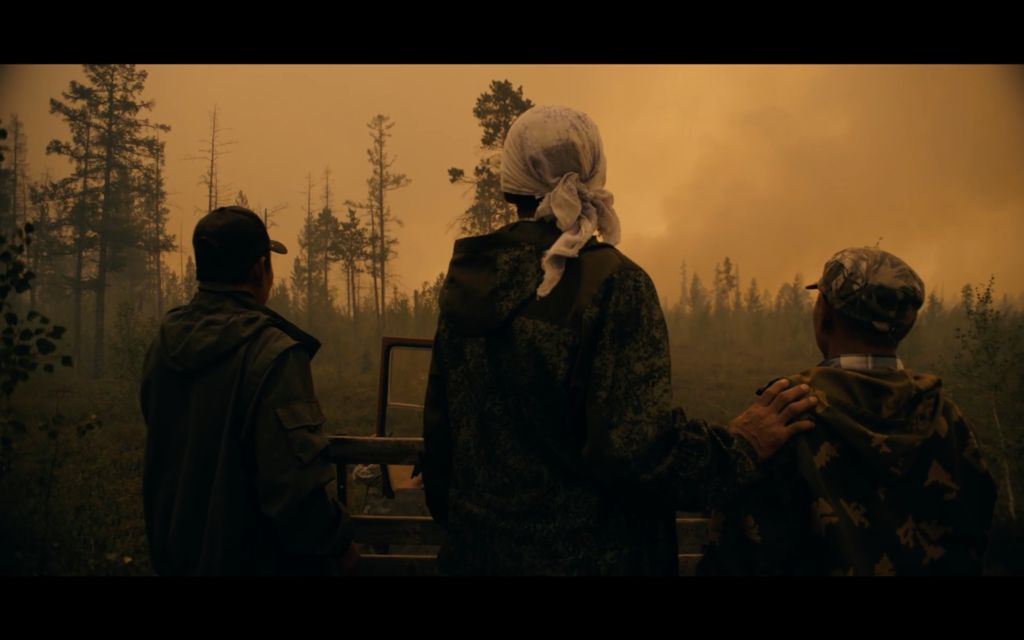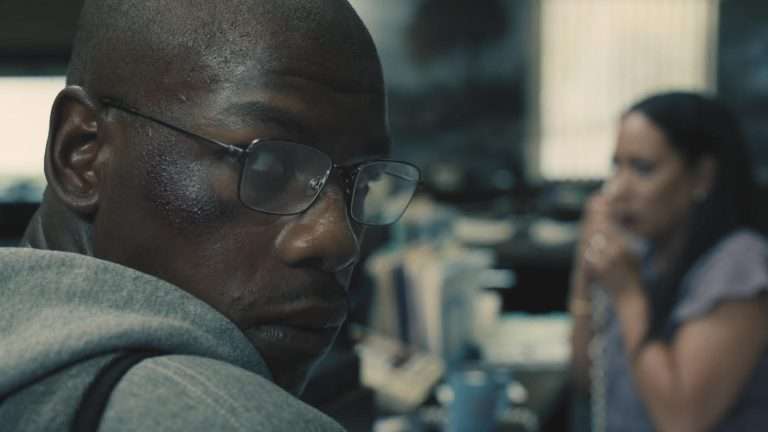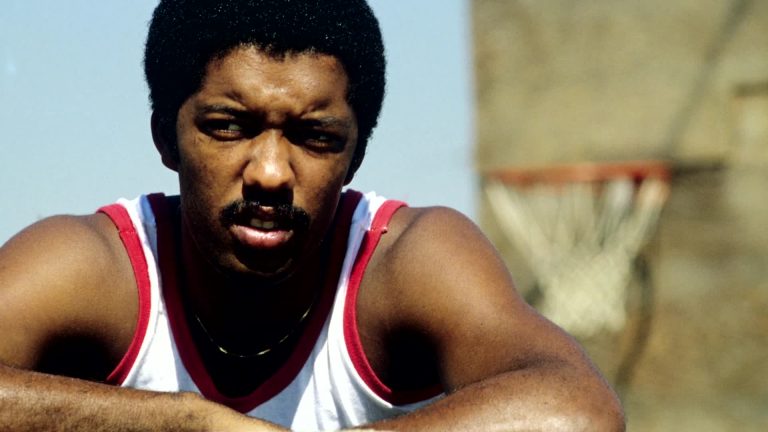Paradise (2022) is Russian documentary filmmaker Alexander Abaturov’s third feature-length documentary. I saw his Berlinale entry The Son (2018), an intimate reflection on the Russian military, made after the death of Abaturov’s cousin, Dima Ilukhin. Paradise is set in the subarctic forests of Sakha Republic (north-eastern part of Siberia), home to the world’s most expansive boreal forest. The area is also known as taiga. This is one of the areas that were hit by unprecedented wildfires, fueled by extreme drought and strong winds. In fact, the fires have destroyed more than 19 million hectares of Russian forest. The rapidly rising temperatures at the Arctic – caused by human-made climate change – are the cause for such heat waves and forest fires.
Abaturov, in Paradise, closely focuses on the inhabitants of a village named Shologon, which lies in the taiga landscape. Moreover, the place is on the path of the fast-approaching inferno of wildfires. Moscow is full of empty promises when it comes to its far-flung, multi-ethnic eastern territories. In 2015, the Russian bureaucracy came up with a new law which made its disregard for these territories very apparent. According to this law, authorities are no longer required to combat forest fires in the ‘control zone’, if the cost of extinguishing it would exceed the estimated material damage the fire will cause. The village of Shologon lies at the fringes of ‘control zone’. Hence the villagers are largely left on their own to save themselves.
Similar to Abaturov’s previous documentary The Son, Paradise is not a traditional commentary or thesis-oriented documentary. In The Son, the documentarian’s expertly shot footage showcases the training process of young elite Russian troops. The filmmaker’s personal loss could be the motivation behind it. But the astounding series of image, crafted with auteurial vision, doesn’t go for an expository style. This might frustrate viewers who expect their documentaries to withhold a simple core message. However, if we look closely, we would definitely find a thesis through the filmmaker’s visualizations and modes of observation.
Abaturov continues such creative documentary film-making in Paradise too. He doesn’t introduce us to a set of players, then establish their personal feelings in reality TV style, and goes on to emphasize upon their great fight for survival. A determined villager named Vasya, the world-weary Shologon mayor, and a fire-fighter named Pavel Arzhakov are some of the individuals we get to know in the documentary. But Abaturov and his DoP Paul Guilhaume largely captures this tragic and tense real-life story through unforgettable images. It is through the perceptive and beautiful images we come to gradually understand the micro and macro conflicts.
The information of cousin’s death in The Son and the description about ‘control zone’ in Paradise provides the necessary context, so that we could patiently follow Abaturov’s visual journey through Shologon and its humble, down-to-earth inhabitants. Paradise opens like a narrative cinema at the remote, wintry landscape of Siberia. An old man makes a fire and sits around it to warm himself. The fire that provides comfort on a cold night comes back in the summer in the gigantic form of wildfires. Though Shologon is a remote, sparsely populated place, with high percent of elderly people, the residents are well-equipped –technically as well as mentally – in order to rise up to the task of combating wildfires.
Earlier in Paradise, the villagers embark on a trip in their tractor, entering into the fire zone to do some controlled burns. Soon, they are engulfed by strong orange haze of smoke, and it looks like the glow of radioactive fallout in Blade Runner 2049. The villagers fascinatingly call the out-of-control wildfires as ‘The Dragon’. As the tractor-truck withdraws itself from the fire zone, strong winds accompany the orange smoke. And it almost feels like a giant dragon is moving through the lands. In fact, Paradise is full of such visually powerful moments that deeply immerse us into the impending atmosphere of catastrophe.
Juxtaposed alongside the villagers’ struggle with the wildfires is the rendition of a local fairy tale involving a sacred mountain and an unchained wind. An 11 or 12-year old girl gives voice to this exchange between the mountain and wind, which revolves around reconciliation of men. The sacred mountain advises the wind to show its mighty strength and power. Interestingly, the fairy-tale sounds grimly relevant as the great winds and unrelenting fires wreak havoc over the vast landscape. The humans come together for briefest of moments to put up a fight. But their determination is somewhat damaged by the red tape.
Pavel the smoke-jumper (specially trained forest fire fighters) is called back from the emergency situation to attend to dull bureaucratic process. On a broader note, reconciliation of humans looks like a distant dream, despite nature’s battle cry in the form of disasters. Paradise does have its share of poignant and light-hearted moments. There’s a moving conversation between fire-fighters after an exhausting work-day. The village women’s efforts to support their wildfire-fighting husbands add natural humor to the otherwise grim proceedings. Abaturov magnificently captures the slow and dreadful invasion of wildfires into the lands surrounding Shologon.
Alexander Abaturov’s Paradise, thankfully, ends on a note of hope. The Great Wind in the Sakha fairy-tale rejoices in the end by the unity of human beings. The villagers’ unity temporarily thwarts the raging wildfires. The strong sense of community prevails among them, and it might prepare them for future challenges. Nevertheless, we the human race are very slow to react to the great threat of global warming.
Paradise (89 minutes) subtly observes the devastating consequences of climate change. Through haunting imagery and simple folklore, director Abaturov shows the threat looming over the only paradise we will ever know.




![A Rifle and a Bag [2020]: ‘DIFF’ Review – A quiet look in the life of an ex naxalite family.](https://79468c92.delivery.rocketcdn.me/wp-content/uploads/2020/10/A-Rifle-and-a-Bag-768x432.jpg)

![Tina [2021]: ‘Berlinale’ Review – The inspirational true story occasionally thrills but ultimately feels rushed](https://79468c92.delivery.rocketcdn.me/wp-content/uploads/2021/03/Tina-1-highonfilms-768x509.jpg)


![Matter Out of Place [2022]: ‘Locarno’ Review – We Have A Serious Garbage Problem!](https://79468c92.delivery.rocketcdn.me/wp-content/uploads/2022/08/Matter-Out-of-Place-2022-768x416.jpg)